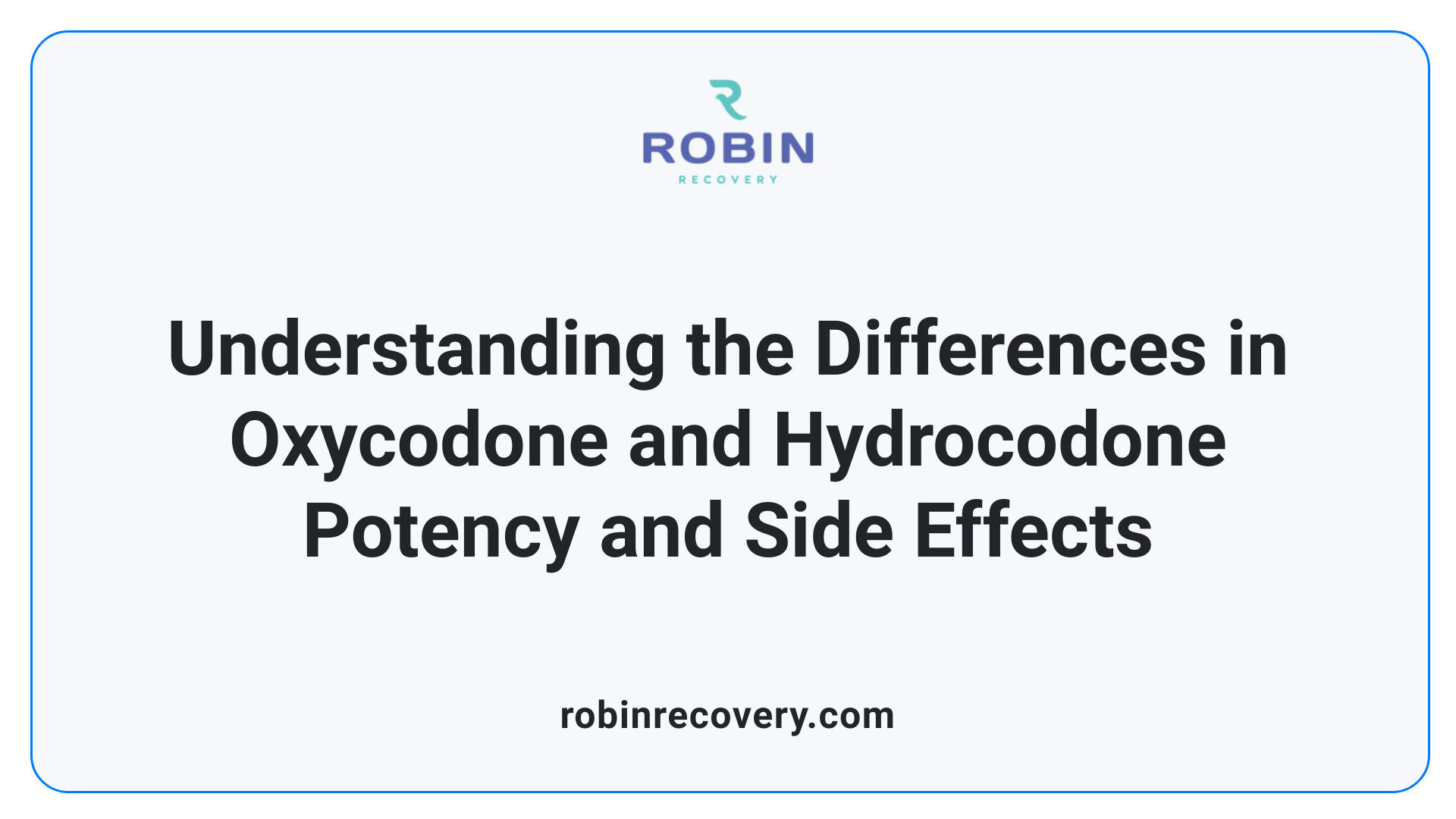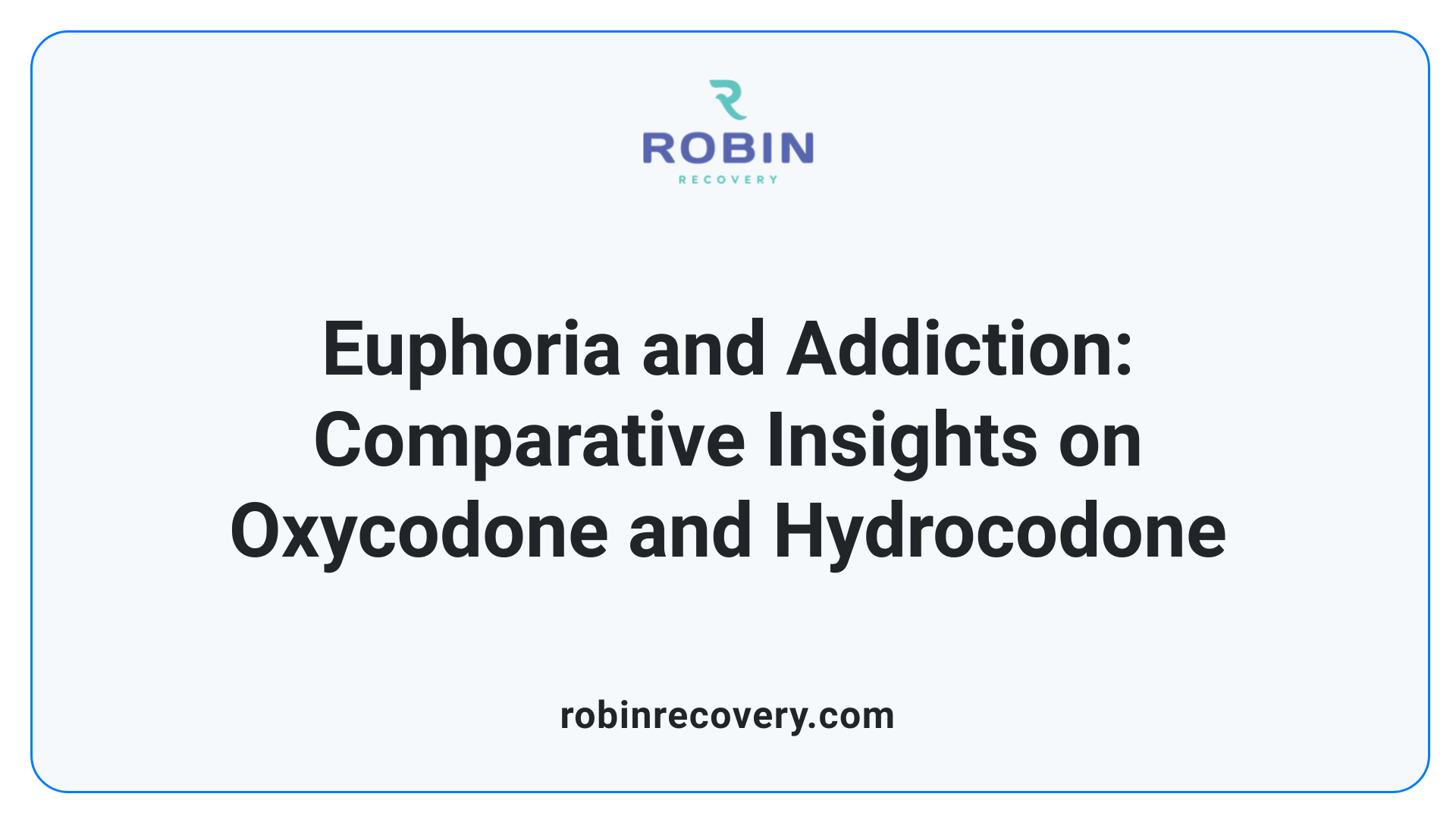Explanation of Hydrocodone vs Oxycodone

Understanding the Complexity of Opioid Medications
In the realm of pain management, opioids such as hydrocodone and oxycodone are often at the forefront of prescribing practices. These medications, while similar in some respects, differ significantly in potency, effects, and potential for addiction. As we navigate the complexities of these drugs, it becomes essential to break down their characteristics to make informed medical decisions.
Comparing Potency and Effects

What is the main difference between oxycodone and hydrocodone?
Oxycodone and hydrocodone are both widely prescribed opioids, but they differ significantly in terms of potency and side effects. Oxycodone is generally regarded as more potent, meaning a lower dose is effective for pain relief compared to hydrocodone. This potency leads to an increased risk of abuse and overdose associated with oxycodone use.
Side effects including drowsiness and constipation
While both medications can cause common side effects like nausea and dizziness, their specific side effects do vary. Hydrocodone users often report feelings of drowsiness and tiredness, making it more likely to cause fatigue. In contrast, oxycodone is frequently associated with gastrointestinal issues, particularly constipation. In studies, about 21% of hydrocodone users experienced constipation, while no cases were noted among oxycodone users.
Risk of abuse and overdose
Both oxycodone and hydrocodone have a high potential for addiction due to their opioid nature. However, oxycodone's stronger effects can lead to a greater risk of misuse and subsequent overdose. Long-term use often creates a tolerance, requiring increasing doses to maintain effectiveness, which further escalates addiction risks. The misuse of either medication can result in severe consequences, including withdrawal symptoms upon abrupt discontinuation.
Aspect Oxycodone Hydrocodone Potency Higher, effective in smaller doses Lower, requires larger doses Common Side Effects More constipation More drowsiness Addiction Risk Higher due to potency Significant, though lower than oxycodone
It is essential to follow a doctor's guidance when using these medications to mitigate their potential dangers and maximize their therapeutic effects.
Side Effects and Sleepiness

Which causes more sleepiness, oxycodone or hydrocodone?
Both hydrocodone and oxycodone belong to the opioid class of medications and can lead to drowsiness. However, hydrocodone is generally recognized to cause more tiredness than oxycodone. This distinction plays a significant role in how patients respond to each medication, especially when considering their daily activities and overall quality of life.
On the other hand, oxycodone, while often slightly stronger in pain relief, is known to potentially cause constipation as a predominant side effect. It may also lead to sedation, particularly at higher doses, which can add complexity to its use.
Potential for respiratory depression and other severe side effects
Both hydrocodone and oxycodone pose risks for serious side effects, including respiratory depression. This side effect, characterized by slowed or difficult breathing, can occur at higher doses of either medication. The risk of respiratory depression is especially concerning when these opioids are combined with other central nervous system depressants, such as alcohol or benzodiazepines.
Given these severe potential outcomes, it is crucial to follow a doctor’s prescribing guidelines to mitigate these risks effectively. Individual responses to each medication can differ widely, making it essential for patients to communicate with healthcare professionals about their experiences and any side effects encountered during treatment.
Medication Tendency for Tiredness Common Side Effects Severe Risks Hydrocodone Higher Drowsiness, constipation, nausea Respiratory Depression Oxycodone Moderate Drowsiness, constipation, nausea Respiratory Depression
Detection and Lab Testing

Can laboratory tests differentiate between hydrocodone and oxycodone?
Yes, laboratory tests can indeed distinguish between hydrocodone and oxycodone. Both drugs can appear in urine tests, but their detection rates and concentrations vary. Hydrocodone may be detected as an impurity in oxycodone formulations; however, it typically shows up at concentrations less than 1% in urine tests.
Impurity Ratios and Implications for Testing
A notable study involving 319 patients revealed the mean ratio of hydrocodone to oxycodone was approximately 0.57%, while hydromorphone was found at a ratio of 0.81% among those using oxycodone. These findings indicate that when impurity levels are below 1%, they are likely sourced from the oxycodone itself and not from an external intake of hydrocodone. This data is vital for assessing prescription compliance and accurately interpreting urine drug test results, ultimately aiding in responsible opioid monitoring and management.
Euphoria and Abuse Potential

Do oxycodone and hydrocodone differ in the level of euphoria they produce?
Both oxycodone and hydrocodone trigger feelings of euphoria by binding to opioid receptors in the brain. Despite their similar foundational mechanisms, studies suggest a difference in user preference: oxycodone is generally favored for its stronger euphoric effects.
Users report higher likability scores for oxycodone, often attributing this preference to its effectiveness in producing desired feelings with potentially fewer negative side effects. This distinction is critical, particularly as it relates to potential for misuse and addiction.
Comparative studies on abuse liability
Research shows that while hydrocodone and morphine demonstrate similar levels of abuse liability, oxycodone significantly outweighs both in terms of misuse potential. This is particularly evident in the context of the current opioid crisis, where oxycodone frequently correlates with increasing addiction and overdose incidents.
Understanding the nuances between these opioids is vital for healthcare providers. Prescriptive awareness can help mitigate the risks associated with the euphoric appeal of these medications, promoting safer use among patients vulnerable to dependence.
MedicationEuphoria LevelAbuse PotentialLikability Score Among Users Oxycodone High Higher Increased preference Hydrocodone Moderate Moderate Lower preference
Clinical Studies and Efficacy

Study Designs Comparing Effectiveness and Side Effects
Recent studies aimed to directly compare the effectiveness of hydrocodone and oxycodone in managing acute pain. One such study randomized 240 adults in an emergency department setting, assessing the pain relief effects of 5 mg of hydrocodone and 5 mg of oxycodone, both combined with acetaminophen. Pain relief was measured at 30 and 60 minutes post-administration. Results showed similar effectiveness for both medications, with about 60% of patients in each group reporting a 50% or greater decrease in pain.
On side effects, hydrocodone was associated with higher rates of constipation (21% of users) compared to oxycodone (0%). While typical side effects like nausea and drowsiness were reported similarly between users, these insights suggest differing tolerability profiles that can impact clinical decisions.
Indications for Both Short-Term and Chronic Pain Management
Hydrocodone and oxycodone are commonly prescribed for both short-term use—such as after surgery or injury—and long-term management of chronic conditions like cancer and arthritis. Each medication’s formulation, including immediate and extended-release options, allows for flexibility in treating pain. Despite oxycodone being broadly acknowledged as more potent, the studies indicate that prescribing practices may vary based on risks of dependence, with hydrocodone users more likely to transition to long-term use (12% versus 2% for oxycodone).
These findings guide providers in choosing appropriate medications for different pain management scenarios while considering the potential for dependency and side effects.
Key Takeaways
Understanding the distinctions between hydrocodone and oxycodone is vital for both healthcare providers and patients. These opioids, while effective at managing pain, come with significant risks, especially related to addiction and side effects. As with any powerful medication, careful dosage management and clear communication about the potential for dependency are essential in the journey towards effective pain relief. By analyzing current studies and clinical practices, more informed decisions can be made to safely navigate the complex landscape of opioid use.
References
- Hydrocodone vs Oxycodone: Is there a Difference? - Headwaters
- Hydrocodone Vs Oxycodone: Similarities & Differences
- Hydrocodone vs. Oxycodone: The Difference Explained - WebMD
- Comparison of oxycodone and hydrocodone for the ... - PubMed
- Hydrocodone Vs. Oxycodone: Unraveling the Differences
- Hydrocodone vs. Oxycodone: What's the Difference? | Opioids
- No Difference Between Oxycodone/Acetaminophen and ... - AAFP
- Hydrocodone vs Oxycodone: What's the Difference? - BuzzRx
